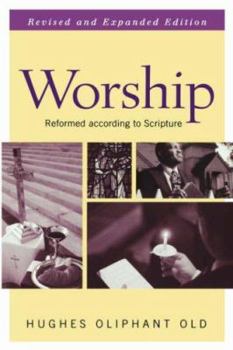Guides to the Reformed Tradition: Worship: That is Reformed According to Scripture
Select Format
Select Condition 
Book Overview
Hughes Old uses primary sources as a springboard to understanding the theology, tradition, and spiritual roots of modern reformed liturgy. Old provides a fascinating and detailed look at liturgical heritage from the continental Reformers of the sixteenth century and the puritans of the seventeenth century. His impressive work emphasizes the biblical, theological roots of reformed worship.
Format:Paperback
Language:English
ISBN:0804232520
ISBN13:9780804232524
Release Date:May 1996
Publisher:Westminster John Knox Press
Length:120 Pages
Weight:0.68 lbs.
Dimensions:0.6" x 5.6" x 8.5"
Customer Reviews
2 ratings
Enriching Study of Reformed Worship
Published by Thriftbooks.com User , 17 years ago
The author traces the historical bases of Reformed worship from the Jewish Temple through the Reformation, thereby connecting the Old and New Testament practices. His explanations of the many facets of worship; e.g. ministries of praise, prayer, word, and sacraments, and the cited examples are clearly stated and readily understandable. Where scripture references are appropriate, they are given and serve to enhance and amplify the reading. The entire book is enriching, serving to make the Reformed worship more meaningful.
Biblical, church-historical and Reformed roots of worship.
Published by Thriftbooks.com User , 19 years ago
Review by Rev. George van Popta In this book, the author introduces all the different aspects of Reformed worship. He treats the following parts: baptism; the Lord's day; the ministry of praise; the ministry of the Word; the ministry of prayer; the Lord's supper; daily prayer; alms. In each case he discusses Old and New Testament roots, development in the synagogue, the early church and the middle ages, and reformation. Old has clearly mastered his topic on both the large and small scales. His bibliography is extensive. In the final chapter," Tradition and Practice," the author enumerates a 15-point program for the renewal of worship in American Protestantism. He wants to avoid two extremes: the first is a sort of archaeological reconstruction in the English language of classic Reformed liturgies that do no more than mechanically and unthinkingly reproduce the tradition; the second is an ignoring of our traditions and of giving ourselves to perpetual liturgical revision (or revolution) thereby losing sight of the great value and importance of having a set liturgy. A tradition radically changed every generation is not a tradition. This is a good book and very pleasant to read. The one who reads it will learn much about the biblical and church-historical roots of the different parts of the worship of the Reformed churches and be led to reflect on why we do things the way we do. Here are two interesting quotations from the book. This first one (p. 148) is in the context of an argument to renew the classical Reformed practice of daily household worship: "For classical Reformed spirituality, morning and evening family prayer was one of the foundations of piety. It was at the heart of the day to day exercising of Christian faith. This made sense to those for whom Covenant theology was so formative. The unity of the family was a significant feature of Covenant theology. With the coming of pietism, daily family prayer was unfortunately replaced with private devotions. "Pietism was very individualistic and many of this persuasion had a hard time understanding why children should be baptized. There was no sacred unity in the family. Each single human being stood before God alone. With the demise of pietism, private devotions began to develop atrophy. They finally became not much more than "five minutes a day." Today as we seek to recover a Reformed spirituality, we need to reach behind pietism and recover the older classical Protestant discipline of daily morning and evening prayer." I'm confident Old is not advancing an either-or dilemma between family worship and private devotion. Surely both are important. He is writing in a North American context that eschews the corporate for the individualistic in matters of relationship to God and neighbour. What follows is the concluding paragraph after the author has put forward his 15-point renewal program for (North) American Protestantism: "This program for the renewal of worship in America






